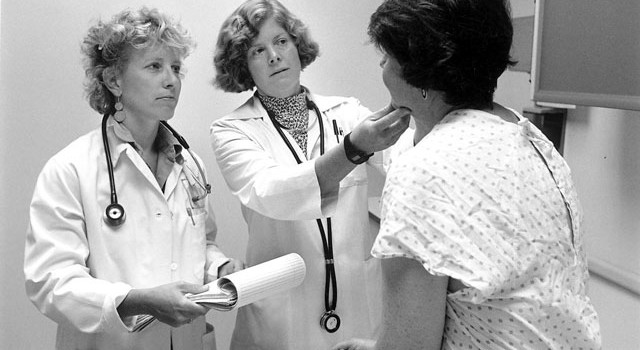5 Ways to Boost a Patient’s Confidence Before Surgery

Feeling scared by the term ‘surgery’ itself? It is a common notion that a surgery can be devastating and sends shivers down the spine. Depending upon how major the surgery is, the fears are proportionate. It may be as minor as a simple laser removal surgery or as big as an open heart bypass surgery. But the anxiety that a patient faces before a surgery is natural and very disturbing.
Photo by Seattle Municipal Archives, CC BY 2.0
Common body reactions due to the pre-surgical stress are raised blood pressure, increased heart beat, nausea, fast breathing and sweating. It can be so scary sometimes that it results in a ‘panic attack’ which can altogether postpone the surgery as well. This lack of confidence before undergoing surgery can be well-managed by a thorough education and explanation to the patient. If needed, professional relaxation techniques may also be brought in use. 5 ways to manage fears about surgery are suggested as below:
1. Patient Education
The underlying disease might be chronic. That means the patient would have already had a long struggle with his disease. Such circumstances lead a lower threshold for stress tolerance. Even with acute illnesses, the patient is never prepared mentally to undergo a surgery. Educating the patient about his or her health problem in simple terms is extremely helpful. For example, a Cancer patient will have common queries like ‘What is the severity of my Cancer?’, ‘how badly is it harming my body?’ and ‘How necessary it is to remove it surgically?’ The fears can be due to unknown reasons or due to some bad experience in a previous surgery. The patient can be explained about the outcome of the surgery in such terms that are directly identified as ‘relief’ by him.
2. Keep The Patient Informed About The Process
A good surgeon has his expertise in operating. But equally important is how well-informed he keeps his patient about the procedure. Most of the patients are not confident about their surgery because they do not know too much about the surgical process. Having a sound knowledge of the medical details like, type of anesthesia to be used and its effects, helps the patient gain confidence. The decision to go ahead with the surgery is taken with more optimism and mental strength. There is always a risk of death in all surgeries, although some are high-risk surgeries. This mortality risk is very scary and should be talked about so that it is not exaggerated. No two surgeries are the same. So it is not necessary that the surgical complications that your friend had will occur after your surgery too. Ask and clarify any queries before deciding to go ahead with the surgery. Ideal outcome of the surgery can be explained by showing self-explanatory videos.
3. Alternative Therapies
The supervised use of alternative remedies to soothe down anxiety caused in apprehension of the surgery is a prevalent practice. Meditation, Yoga, Hypnosis, Biofeedback, acupressure and massage etc. are such techniques that ease the tension and help in attaining a state of relaxation. Although, the use of such therapies is non-traditional and subject to the patient’s consent, they are quite effective in controlling stress levels and preparing the patient better to face the surgery. Certain herbal supplements also claim to calm down hyper-excited nerve endings. But, it is advisable to take surgeon’s consent before consuming such products.
4. Practice Of The Post-Operative Regime
Do not hesitate to ask your surgeon for a practice session of a typical post-operative regime which you would be expected to follow in the recovery room. If the smallest details like nursing positions on bed, way of supporting incisions while moving and coughing, active chest and limbs physiotherapy techniques (if indicated) are demonstrated pre-operatively, you can be more confident with all the things you can move! If it is such a surgery which is going to alter the cosmetic appearance of the patient later, it is very important to prepare the patient for that acceptance. If possible, you can meet patients who have recently undergone a similar surgery to check with their progress.
5. Therapeutic Counseling
Sometimes, the role of the physician, surgeon, family and friends, falls short of the expected level of pre-operative counseling needed. For ex, there are certain fears related to financial issues which the patient is unable to overcome. A professional therapeutic counselor can be then seen, who is not directly related to the medical process. The impartial explanation which is being sought after by the patient, regarding disability coverage and health insurance cover, are such issues that only a counselor can resolve. May it be Life threatening conditions like cancer, or fear of losing important body functions after the surgery, a counselor can handle such fears positively and help you gain confidence, in moving on with the surgery.
Dealing with stress and anxiety management before a planned surgery can be made simpler with easy-to-understand details of the procedure. Also, a sound knowledge of the clinical condition and prognosis of the surgery can help the patient to build confidence and overcome fears pre-operatively. So believe in yourself and your surgeon, get all your answers, and ask for help. Your surgery will certainly leave you in a better health wise condition.